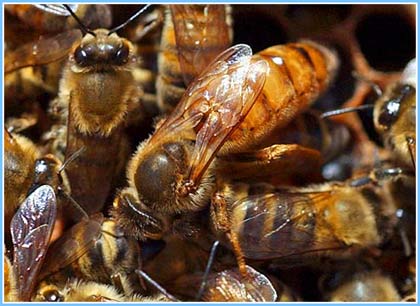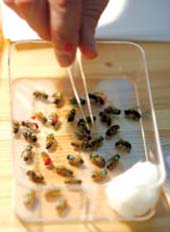Workers were brainwashed
A new finding published in Science shows that since childhood, all worker bees have been " brainwashed " by chemicals to prevent rebellion.
' This is the first experiment to show that pheromones (stimulant hormones) of queen bees have a direct impact on the brain ,' said biologist Alison Mercer of Dunedine University (New Zealand). The co-author said. 'What is totally unexpected is the effect of these stimulants on the learning ability of young bees'.
Control
Royal bees create a pheromone fluid from a gland near the jaw. One of the ingredients of this fluid is ' homovanillyl alcohol ' (HVA). This substance interacts with dopamine (a substance that transmits information between neurons) in the brains of insects and animals. By a mechanism that is still not well understood, this phenomenon can prevent dopamine and not allow small worker bees to have negative stimuli. Worker bees - always surrounded and subduing the queen bee - are all female bees, and honey bees are all male bees.

A beehive with only one queen, from 30,000 to 60,000 bees are female and several hundred honey bees are male.Male bees form from unfertilized eggs of queen bees (fatherless), while female bees are formed from fertilized eggs (enough parents) (Photos: AP, Latimes)
To test this theory, Mercer and colleagues gave experimental bees to this pheromone. The team found that they could not know how to bind particular odors to harmful stimuli - in this case, the stimulus is the mild electric shocks created by the researchers. .
Mercer hypothesized that the queen bee itself could be a source of negative stimulation. Mercer said: 'It turns out that queen bees intercepted the ability of small bees to connect, not allowing them to understand the correlation of signals in their environment and any unpleasant consequences.'

Alison Mercer's research team first tested that the queen's pheromones directly affected the brains of young workers.
However, when this worker bee grows, this phenomenon no longer controls them. This is a secret that Mercer's team continues to pursue.
No way out
Studies show that bees have avoided high-dose pheromone doses of queen bees - the more pheromones are infected, the more aggressive the bees are. But this ' brainwashing ' phenomenon may only be aimed at keeping workers not knowing that being close to a queen is not interesting.
According to Mercer, if the small bees get into aversion to queen bees, they will not take care of the queen bee and thus will harm the bees. This phenomenon may be a way to protect the queen bee against the small workers' rebellion. It is for the benefit of both the bees and the queen bee that the queen bee has these vital weapons.
This raises another problem: what effect does this phenomenon have on the queen herself, who during her reign is just a immobile machine? Queen bees produce all worker bees, and they are all sisters, having half the DNA genetics. The ' super sisters ' share a father and 75% of the DNA system. Mercer said: 'It is important that the queen bee does not form an aversion to any taste of the bees, otherwise it will escape the nest'.
Biologist Mark Winston of Simon Fraser University in Vancouver (Canada) is skeptical of Mercer's group's findings. Winston argued that the indifferent reaction to negative stimuli such as Mercer's group proved not to fully explain why the small worker bee lived close to the queen. Winston suggests that future experiments should be done in the hive, not in the lab.

Queen bees check a compartment of the group preparing to lay, while worker bees around service (Photo: Nationalgeographic)
Monopoly reproduction
Not only bees, other studies of the insect world have shown many other mysteries. Worker bees, worker ants and termite workers share food with their mates and raise small insects in the herd. Worker insects, all female, are children of princess insects, usually without eggs, although they all have ovaries.
For decades, scientists have assumed that these bees, ants, and workers have voluntarily helped mothers (gods) raise their children and grandchildren because this is a more effective way of propagation than they reproduce themselves. pick. But new studies show that a typical insect society is not an obligation community. In contrast, according to biologist Tom Wenseleers of the Catholic University of Leuven (Belgium), it is like a miniature dictatorship. In addition to ' royal lineage ', no 'people ' are allowed to reproduce, and 'unauthorized' eggs will be destroyed.
Since 1989, Francis Ratnieks of Sheffield University (UK) has discovered worker bees eating eggs of other bees. Since then, scientists have observed the behavior of eating eggs, called "reproductive policing" in many insect societies.

This phenomenon may be a way to protect the queen bee against the rebellious risk of small worker bees.(Photo: LiveScience)
In the type of bee that bites Asia, the queen herself will kill and eat clean eggs due to her ' daughters '. Among other insects, including honey bees, loyal bees will help queen bees to eat eggs from lower-level bees that have a plan to give birth. Similar findings were published in the November issue of Nature.
Wenseleers commented: ' The act of eating eggs to help maintain the reproductive monarch's monopoly '. Thus, it is not a voluntary act of renouncing the reproductive rights for workers to give up reproductive rights, but a forced act.
With worker bees, worker ants . deprived of reproductive rights, helping children and sisters is the only way for them to maintain their race. ' Even among strangers who are not genetically related, cooperation can still develop ', Wenseleers commented. But when I associate insect society with human society, he adds: ' A society where everyone is willing to cooperate because of fear of being punished is not the kind of society we want to live in .'
Tran Ngoc Dang
- Shocked with the doll simulating office workers after 20 years
- Europe prepares laws for robot workers revolution
- Lenovo cuts 1,000 more workers
- Workers should wash their hands often to protect themselves
- Video: robot skeleton to help workers porter goods
- Why should office workers stand up from their working chairs for at least 2 hours a day?
- The mysterious disease of a series of female workers in Cambodia
- Trees help increase the efficiency of office workers
- Risk of poisoning of office workers
- Video: Iron man armor helps workers save labor
- Accumulated contamination of Fukushima workers is still high
- Fukushima workers died not because of radiation
 Why do potatoes have eyes?
Why do potatoes have eyes? 'Tragedy' the world's largest carnivorous life: Death becomes ... public toilet
'Tragedy' the world's largest carnivorous life: Death becomes ... public toilet Tomatoes were once considered 'poisonous' for 200 years
Tomatoes were once considered 'poisonous' for 200 years Detecting microscopic parasites on human face
Detecting microscopic parasites on human face